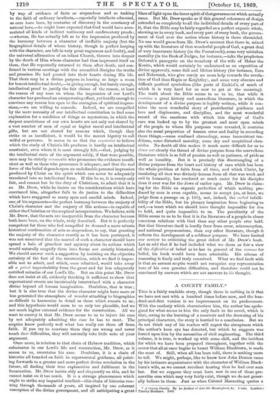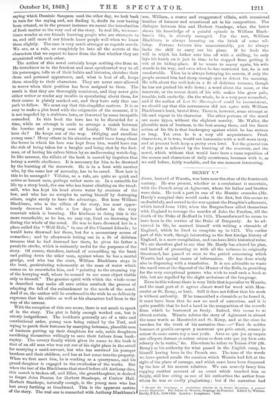A COUNTY FAMILY.* Tans is a fairly readable story, though
there is nothing in it that we have not met with a hundred times before now, and the hun- dred-and-first version is no improvement on its predecessors. With the modesty which characterizes him, the author has apolo- gized for what seems to him the only fault in his novel, which is that, owing to the bursting of a reservoir and the drowning of his principal characters, the story is hurried to a conclusion. But we do not think any of his readers will regret the abruptness which the author's keen eye has detected, but which he suggests was forced upon him by the necessities of civil engineering. The third volume, it is true, is worked up with some skill, and the incident for which we have been prepared throughout, together with the secret that all at once begins to haunt William Blackburn, is made the most of. Still, when all has been told, there is nothing more to tell. We might, perhaps, like to know how John Denton came by his intimate acquaintance with the character of William Black- burn's wife, as we cannot recollect hearing that he had ever seen her. But we suppose they must have met in one of those pre- novelite eras which may very fairly exist, though we do not gener- ally believe in them. Just as when Colonel Mannering quotes a
• A County Family. By he Author of Lost Sir Mamingberd, de. 3 vols. London : Tinsley Brothers. 1869.
saying which Dominie Sampson used the other day, we look back in vain for the saying and, not finding it, doubt its ever having been uttered, so in the present instance we resent the introduction of fresh matter at the very end of the story. In real life, we some- times wonder at our friends knowing people who are strangers to us, and still more if our friends know people well when we know them slightly. The case is very much stronger as regards novels. We are, as a rule, so completely let into all the secrets of the characters that we expect to know from the first whether they are acquainted with each other.
The author of this novel certainly keeps nothing else from us. He introduces us in the frankest and most openhearted way to all his personages, tells us of their habits and histories, sketches their dress and personal appearance, and, what is best of all, keeps them steadily to their characters. They are never once allowed to waver when their position has been assigned to them. The result is that they are thoroughly consistent, and they never give either writer or reader any trouble in speculating about them, for their course is plainly marked out, and they have only that one path to follow. We must say that this simplifies matters. It is so easy to make a plot bend with the exigencies of the moment, if it is not impeded by a stubborn hero, or thwarted by some incapable scoundrel. In this book the hero has to be discarded for a time, while an attempt is made to arrange a match between the heroine and a young man of family. What does the hero do ? He keeps out of the way. Obliging and excellent young man ! Many others in his situation would have hung about the house in which his love was kept from him, would have run the risk of being taken for a burglar and being shot by the foot- man, or of having his calves bitten by an undiscerning watch-dog. In like manner, the villain of the book is moved by impulses that betray a servile obedience. It is necessary for him to be drowned by the bursting of the reservoir. He is in a boat with another who, by the same law of necessity, has to be saved. Now how is this to be managed ? Villains, as a rule, are quite as quick and active as honest men, perhaps rather more so. In a scramble for life up a steep bank, the one who has learnt climbing on the tread- mill, who has kept his head above water by evasions of the law, and who has no scruples in saving himself by destroying others, ought surely to have the advantage. But here William Blackburn, who is the villain of the story, has most oppor- tunely drowned his wife a few days before in the very reservoir which is bursting. His kindness in doing this is the more remarkable, as he has, we may say, lived on drowning her during the whole of the novel. He was to have drowned her in a place called the "Well Hole," in one of the Channel Islands ; he would have drowned her there, but for a momentary access of cowardice ; and by afterwards letting out in a fit of delirium tremens that he had drowned her there, he gives his father a paralytic stroke, which is eminently useful for the purposes of the story. Of course, therefore, instead of scrambling up the bank and pulling down the other man, against whom he has a mortal grudge, and who has the start, William Blackburn stays in the boat, gesticulating vehemently at the mass of water which comes on to overwhelm him, and " pointing to the creaming top of the hurrying wall, where he seemed to see some object visible only to himself." The genuine spirit with which the whole scene is described may make all save critics overlook the process of adapting the fall of the embankment to the needs of the novel. And if so, the author will be confirmed in the wish he so delicately expresses that his critics as well as his characters had been in the way of the torrent.
With the exception of this one scene, there is not much to speak of in the story. The plot is fairly enough worked out, but is utterly insignificant. The incidents generally are of a trite and conventional order, young men being ruined by the Turf, and trying to patch their fortunes by marrying heiresses, plausible men of business putting up their daughters for sale, noble daughters sacrificing themselves willingly to save their fathers from bank- ruptcy. The county family which gives its name to the book is that of an old man who was cut out of his right place in the entail for marrying a maid-servant, but who has survived his younger brothers and their children, and has at last come into the property. When we first meet him, he is working as a quarryman, and his grand-daughter is engaged to the overlooker of the works. But when the last of the Blackburns that stood before old Anthony dies, this match is broken off, and Ellen, the granddaughter, is desired to forget John Denton for Herbert Stanhope, of Curlew Hall. Herbert Stanhope, naturally enough, is the young man who has lost every farthing at Goodwood. This is the apparent motive of the story. The real one is connected with Anthony Blackburn's
son, William, a coarse and exaggerated villain, with occasional touches of humour and sensational art in his composition. The dialogue between him and Herbert Stanhope, when the latter shows his knowledge of a painful episode in William Black- burn's life, is cleverly managed. For the rest, William Blackburn is always hovering on the brink of some vil- lainy. Fortune favours hint unaccountably, yet he always lacks the skill to carry out his plans. If he finds the will in which his father cuts him off with a shilling, he only lays his hands on it just in time to be stopped from getting it out of its hiding-place. If he wants to marry again, his wife stands in his way, and even when lie has murdered her, he is not comfortable. Then he is always betraying his secrets, if only the people around him had sharp enough eyes to detect his meaning. He tells about the well-hole in a fit of delirium tremens, though he has not pushed his wife down ; a word about the moor, or the reservoir, or the recent death of his wife makes him grow pale, tremble, talk excitedly. On the whole, he is a very poor scoundrel, and if the author of Lost Sir lfassingberd could be inconsistent, we should say that this nervousness did not agree with William Blackburn's hard, brutal fibre. There is, however, some attempt at life and vigour in his character. The other persons of the novel are mere types, without the slightest novelty. Mr. Waller, the plausible man of business, is the best among them, and the finest action of his life is that bankruptcy against which he has striven so long. Yet even he is a very old acquaintance. Fresh characters, it is true, would not harmonize with a well-worn story, and at present both keep a pretty even level. Yet the general run of the plot is relieved by the bursting of the reservoir, and the novel, which without that would have been a tame repetition of the scenes and characters of daily occurrence, becomes with it, as we said before, fairly readable, and for one moment interesting.































 Previous page
Previous page